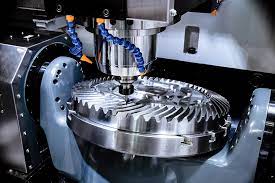CNC machining is a manufacturing process that utilizes computer-controlled machines to create precise and intricate parts and components. The term “CNC” stands for “computer numerical control,” which refers to the use of computer software to control the movements of the machines.
So What is CNC Machining
CNC machining involves the use of automated machines that are programmed to perform specific tasks, such as cutting, drilling, and shaping materials. The process allows for high precision and accuracy, making it an ideal solution for creating complex parts and components.
Brief History of CNC Machining
The origins of CNC machining can be traced back to the early 1950s, when the first computer-controlled machines were developed for the aerospace industry. Over the following decades, advancements in technology led to the development of more sophisticated machines and software, making CNC machining more accessible and widely used across different industries.
Why Is It Important
CNC machining has become a critical component of modern manufacturing, as it offers several advantages over traditional machining methods. The ability to automate processes and use computer software to control the machines allows for greater precision, efficiency, and consistency, resulting in higher-quality products and increased productivity. As a result, CNC machining is used in a wide range of industries, including aerospace, automotive, electronics, and medical device manufacturing, among others.
Advantages of CNC Machining
CNC machining offers several advantages over traditional machining methods. Here are some of the most notable benefits:
Precision and Accuracy
CNC machines are highly accurate and precise, thanks to the computer-controlled movements of the machines. This allows for intricate and complex parts and components to be created with a high degree of accuracy, which is essential in industries such as aerospace, medical device manufacturing, and electronics.
Efficiency and Speed
CNC machines are highly efficient and can produce parts and components quickly, thanks to their automated processes. This allows for faster turnaround times and increased production capacity, which is essential in industries where time-to-market is critical.
Consistency and Repeatability
CNC machines offer a high level of consistency and repeatability, as the machines are programmed to perform specific tasks in a consistent manner. This ensures that each part or component is identical to the others, which is crucial in industries where quality control is of utmost importance.
Increased Production Capacity
CNC machines can run continuously for long periods of time, without the need for manual intervention. This allows for increased production capacity and the ability to produce large quantities of parts and components in a shorter amount of time.
Reduced Labor Costs
CNC machines require less manual labor than traditional machining methods, as the machines are automated and can perform tasks without the need for human intervention. This leads to reduced labor costs and allows for greater efficiency in production processes.
Applications of CNC Machining
CNC machining has a wide range of applications across different industries. Here are some of the most common applications:
Aerospace and Aviation
CNC machining is widely used in the aerospace and aviation industry to create complex and precise parts and components for aircraft, such as engine components, landing gear, and structural parts. The high precision and accuracy of CNC machining are critical in this industry, as even the slightest error can have catastrophic consequences.
Automotive
CNC machining is also used in the automotive industry to create high-quality parts and components for cars and other vehicles. This includes engine components, transmission parts, and suspension components, among others. The efficiency and speed of CNC machining also make it an ideal solution for the mass production of automotive parts.
Electronics
CNC machining is used in the electronics industry to create intricate and precise parts and components for electronic devices, such as circuit boards and microchips. The high level of accuracy and precision of CNC machining ensures that the components are of high quality and function properly.
Medical Device Manufacturing
CNC machining is essential in the medical device manufacturing industry, as it allows for the creation of complex and precise components for medical devices, such as surgical instruments and implantable devices. The high level of precision and accuracy of CNC machining is essential in ensuring the safety and effectiveness of these devices.
Industrial Machinery
CNC machining is used in the production of industrial machinery, such as printing presses, lathes, and milling machines. The ability to create precise and accurate components is critical in ensuring the performance and reliability of these machines.
Furniture Making
CNC machining is also used in the furniture making industry to create intricate and precise parts for furniture, such as table legs and chair components. The efficiency and speed of CNC machining make it an ideal solution for the mass production of furniture parts.
Materials Used in CNC Machining
CNC machining can be used to create parts and components from a wide range of materials. Here are some of the most common materials used in CNC machining:
Metals
Metals are one of the most commonly used materials in CNC machining. They can be cut, drilled, and shaped into complex parts and components with a high degree of accuracy and precision. Common metals used in CNC machining include aluminum, brass, copper, stainless steel, and titanium.
Plastics
Plastics are another commonly used material in CNC machining. They can be easily machined into complex shapes and have a wide range of applications in industries such as automotive, electronics, and medical device manufacturing. Common plastics used in CNC machining include polycarbonate, acrylic, nylon, and PVC.
Composites
Composites are materials made from two or more constituent materials that have different physical or chemical properties. They are used in industries such as aerospace, automotive, and sports equipment manufacturing. CNC machining is used to create precise and intricate shapes from composite materials such as carbon fiber, fiberglass, and Kevlar.
Ceramics
Ceramics are a hard and brittle material that is used in industries such as medical device manufacturing, aerospace, and electronics. They are machined using CNC machines to create precise and complex shapes. Common ceramic materials used in CNC machining include alumina, zirconia, and silicon nitride.
Wood
Wood is a natural material that is used in furniture making, architectural woodworking, and other applications. CNC machining is used to create intricate and complex shapes from wood, such as decorative moldings, furniture parts, and musical instruments.
These materials are just a few examples of the wide range of materials that can be used in CNC machining, and the list is continually expanding as new materials and applications are developed.
Environmental Impact of CNC Machining
CNC machining can have both positive and negative impacts on the environment. Here are some of the ways in which CNC machining can have a positive impact on the environment:
Waste Reduction
CNC machining is a highly efficient manufacturing process that produces minimal waste. This is because CNC machines are able to cut and shape materials with a high degree of accuracy and precision, resulting in very little material waste. Additionally, any waste that is produced can often be recycled or reused, further reducing the environmental impact of CNC machining.
Energy Efficiency
CNC machines are highly energy-efficient, as they use only the amount of energy required to perform the machining operation. This is because CNC machines are designed to operate at optimal speeds and feeds, minimizing energy consumption. Additionally, CNC machines can be programmed to optimize tool paths, further reducing energy consumption.
Sustainability Initiatives
Many CNC machining companies are implementing sustainability initiatives to reduce their environmental impact. These initiatives can include using eco-friendly materials, recycling waste materials, and implementing energy-efficient practices. By doing so, CNC machining companies are able to reduce their environmental footprint while still producing high-quality parts and components.
While CNC machining can have a positive impact on the environment, it is important to note that it can also have a negative impact if proper precautions are not taken. For example, the use of certain materials or chemicals in the machining process can be harmful to the environment if not properly disposed of. Additionally, the energy consumption required to power CNC machines can have a negative impact on the environment if the energy is not generated from renewable sources.
Overall, the environmental impact of CNC machining is largely dependent on the practices and initiatives implemented by individual companies and the industry as a whole. By implementing sustainable practices and initiatives, CNC machining can continue to be an important manufacturing process while minimizing its impact on the environment.
Choosing an Online CNC Machining Service Provider
When choosing an online CNC machining service provider, there are several factors to consider to ensure that you select a reliable and high-quality service. Here are some factors to consider and questions to ask when choosing an online CNC machining service provider:
Factors to Consider
Quality
Quality is a crucial factor to consider when selecting a CNC machining service provider. You want to ensure that the provider has a proven track record of delivering high-quality parts and components that meet your specifications.
Speed and Turnaround Time
The speed and turnaround time of the service provider can be a critical factor if you need your parts quickly. You want to ensure that the provider can meet your deadline and deliver your parts in a timely manner.
Cost
Cost is an important factor to consider when choosing a CNC machining service provider. You want to ensure that the provider offers competitive pricing without compromising on quality.
Instant Quote
An instant quote feature is an additional factor to consider when selecting a CNC machining service provider. This feature allows you to upload your part design and receive an instant quote for the cost of producing the part, based on the specifications and materials you have selected.
Customer Service
Good customer service is crucial when working with an online service provider. You want to ensure that the provider is responsive to your inquiries and provides you with clear and timely communication throughout the entire process.
Questions to Ask
What Materials Do You Work With?
It is important to ensure that the CNC machining service provider can work with the materials you need for your project.
What Kind of CNC Machines Do You Use?
The type of CNC machines used by the service provider can affect the quality and precision of the final parts. You want to ensure that they use the latest and most advanced machines.
What is Your Quality Control Process?
It is important to ensure that the service provider has a robust quality control process in place to ensure that the final parts meet your specifications.
What is Your Turnaround Time?
You want to ensure that the service provider can deliver your parts within your desired timeframe.
What is Your Pricing Structure?
It is important to understand the pricing structure of the service provider and ensure that it is transparent and competitive.
What is Your Customer Service Process?
You want to ensure that the service provider has a responsive and helpful customer service team that can provide you with clear communication throughout the entire process.
By considering these factors and asking these questions, you can select an online CNC machining service provider that meets your needs and delivers high-quality parts and components for your project.








